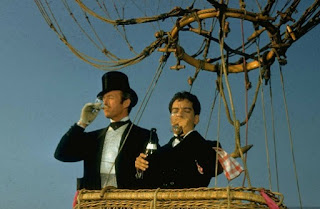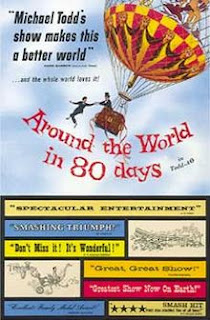Around the World in 80 Days is not so much a movie as it is an event, and one in which producer Michael Todd worked tirelessly to bring to the screen. The background to this film is almost, if not more, interesting than the movie itself. Robert Osborne of TCM fame gives an 8 minute long introduction on my DVD that enlightens with panache.
This was the ONLY movie that Michael Todd produced. Given that it won the Academy Award for Best Picture, that is rather impressive on it's own. The movie also has a plethora of cameo appearances. (Some 50 or so are listed on the wikipedia page, and there are probably even more, since I only can identify by sight about ½ of those on THAT list). Todd was apparently quite the expert at talking people into doing appearances for him in this film.
In particular was the addition of Cantinflas (a Mexican playing a Frenchman, without, I might add, even trying to pretend that he was French). Cantinflas had never made an English language film before, and in fact, had not made a film in which he was not involved in all aspects of the filming for quite some time. But Todd got his Passepartout. As well as his Fogg. It seems David Niven was the only person Todd considered for the part, and Niven was enthusiatic about playing him. But both of those are the stars.
 |
| Niven and Cantinflas |
As far as cameo roles (and according to Osbourne's commentary, Todd's movie was the first to co-opt the term "cameo role"), the list is astounding. People who have no lines, as well as certain roles that are a bit meatier than you would expect for a role termed as "cameo" fill out this film. Just a smattering of names to drop : Frank Sinatra, Peter Lorre, Marlene Dietrich, Caesar Romero, John Carradine, Charles Boyer, George Raft, Victor McLaglen, Buster Keaton, Sir John Guilgud, Noel Coward and many more.
 |
| Sinatra as a piano player, one of the many "cameos" |
The picture really does not convey all it's magnificence on a small screen, even in wide screen format. To do it justice, you really should view it on the big screen. I vaguely recall seeing it that way on a re-release when I was a wee lad. I don't think I knew half of what was going on, but I have memories of some magnificent vistas. The film was the first to use Todd-AO film process, which incorporated the stle of Cinerama, but instead of having to use three separate cameras to capture the scenes, it only used one.
If you are blessed with a big screen TV and surround sound capabilities, I highly recommend this film for family movie night. Even if you don't have $$ coming out the wazoo for that, it's still worth a look.
Around the World in 80 Days (1956)
The movie starts out with a bit of trivia, designed to show how the world has shrunk, in effect since man first walked on the Earth. Included is a monologue, delivered by Edward R. Murrow, and a viewing of the Georges Méliès' film adaptation of Verne's moon trip novels, called A Trip to the Moon. Also included is a wistful conjecture that man may actually make it to the moon in the near future. (The movie was made in 1956, and the actual first moon landing was still in the future). Gradually the movie gives way to the actual film we came to see.
 |
| Phineas Fogg |
It is set, at the beginning, in Victorian London. Phileas Fogg (David Niven) approaches the Reform Club, and we are given evidence of his punctual nature by the fact that he checks his watch as he steps in the door. Around the club we see various patrons engaged in being very, very conservative British aristocrats. At the same time we are introduced to Passepartout (Cantinflas) as he is engaged in navigating a bicycle (what is known as a "penny-farthing", the one with the over-sized front wheel) around the city, as well as his attraction to those of the opposite sex.
 |
| Passepartout |
Passepartout is in search of a job. While waiting in the employment office, he observes a despairing valet (Sir John Guilgud) announce to the employment agent (Noel Coward) that he cannot take any more of his job, at which he has been employed only 20 days. The frustrating employer, as it turns out, is our Mr. Fogg, who is particular about every aspect of his life, from the time he takes his meals to the temperature and level of water of his bath. Passepartout volunteers for the job and is immediately hired (the employment agent has a hard time keeping Fogg supplied with valets...)
Meanwhile back at the reform club, discussion during a game of whist centers on the recent robbery of the Bank of England, of which one of the members at the table is the President (Robert Morley). The discussion turns to the size of the globe where the culprit could had, which leads to Fogg stating that you could navigate the entire globe in only 80 days. A wager is made in which Fogg agrees to prove his statement, rather impulsively stating that he will leave that very evening.
 |
| At the Reform Club |
Fast forward a bit, because the next scenes are of Fogg and Passpartout in Paris, where they are busy trying to engage a train trip. But a kink in the plans causes Fogg to have to abandon the train trip in favor of using a hot air balloon. This is good, in a sense, because, at least according to the story, Fogg gains some time in his itinerary due to this development. (We also get to see some of the first magnificent vistas for which you will wish for the big screen...)
The duo land in Spain where, due to a need to use a visiting dignitary's private boat, Passepartout is engaged to perform in a bullfight. There are some very comedic acrobatics when Cantinflas enters the ring. (He was among other things an acrobat).
 |
| In the bullring |
Meanwhile a police inspector named Fix (Robert Newton) has begun a systematic attempt to find some way to arrest Fogg whom he suspects is the bank robber involved in the previously mentioned Bank of England robbery. He will doggedly pursue Fogg, and use his wiles to get to be a passing acquaintance who just happens to be on the same ships and trains that Fogg is using for his wager.
I
 |
| Inspector Fix |
At every point, there is some predicament that seems to interfere with Fogg's potential success at winning his wager, including a train that is derailed, a ship that sails without him but with Passeportout aboard), and the need to rescue a princess (Shirley MacLaine, looking astoundingly young and beautiful in only her third role) from a sacrifice ritual. Aouda, the princess, becomes their companion through out the rest of the journey.
 |
| Fogg, Fix and Aouda |
Spoiler Alert! If you don't already know the ending and want to watch the movie before you know the ending stop now! As I intend to reveal an important fact, as well as the ending.
When Fogg finally arrives in England, Fix finally gets his proper papers to have Fogg arrested. This causes an extra delay, which Fogg thinks causes him to lose his bet. He is released, but he goes about normal business as if he had lost. Passeportout discovers, however, that during the journey they had gained a day by crossing the International Date Line from the West to the East. Meaning that Fogg wins the wager, that is IF he can make it to the Reform Club before the final bell tolls on the clock.
The question that is skimmed over, in case you missed it, is, if they crossed the International Date Line, and Fogg's itinerary was actually a day ahead, wouldn't he have noticed long before he got to London that he was running a day ahead of schedule? Everything was planned according to a set schedule, and Fogg, if anything, is a perfectionist about being on time. This little slip can be blamed on Verne, since it is the key fact at the end of the novel and the filmmakers were faithful to that part of the book, at least.
That little bit does not reduce the enjoyment of the movie, for me, anyway. I just tend to be a nitpicker sometimes...
Well, it's time to pack up the timetables and cruise on home. The old Plymouth is dependable for at least that short distance. Have a safe trip home kiddies.
Quiggy



Have not seen this one since I was a kid. I think it's time to revisit, looks like so much fun!
ReplyDelete-Chris
It's worth every penny. Hope you get a chance to watch it.
ReplyDelete